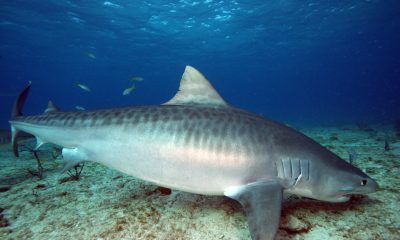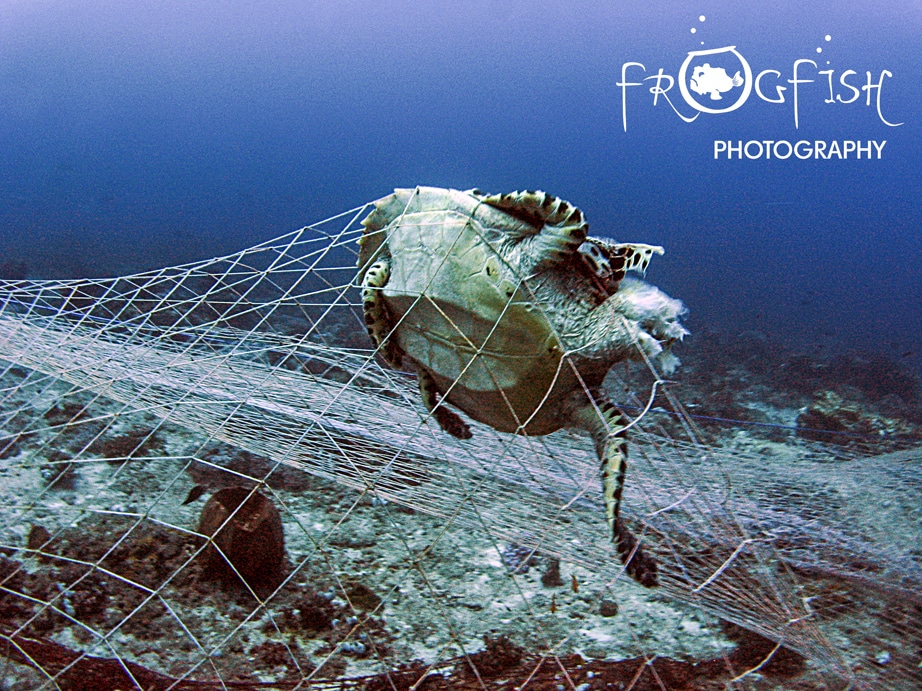Marine Life & Conservation
Proposals unveiled to cut red tape for divers retrieving marine litter

 As part of the government’s ongoing drive to clean up our seas, new proposals launched on Friday will cut red tape and make it easier for divers to remove litter from the seabed.
As part of the government’s ongoing drive to clean up our seas, new proposals launched on Friday will cut red tape and make it easier for divers to remove litter from the seabed.
- New proposals to make it easier for divers to remove marine litter
- Consultation launched to streamline marine licensing system for boat users
- Plans to help tackle abandoned ‘ghost gear’ and clean up seas
Until now, a marine licence may be required for divers who retrieve litter or abandoned, lost and discarded fishing gear – known as ‘ghost gear’ – during the course of a dive. Now, in a consultation launched on Friday 2nd November by Environment Minister Thérèse Coffey, divers will be exempt from the current requirement to have a marine licence – streamlining the existing regime and helping to tackle the 640,000 tonnes of ghost gear lost in our oceans each year. The consultation also brings clarity to boat users who do not require a licence to collect litter or ghost gear from the ocean’s surface.
Environment Minister Thérèse Coffey said: “Diving communities play an important role in protecting our marine environment and tackling the litter and ghost gear that blights our oceans. We want to make it easier for divers and other sea users to play their part, which is why we are looking at how we can cut red tape while still maintaining the highest protections for our precious marine life”.
The proposals to tackle marine litter form part of a wider consultation on changes to the marine licensing system, designed to simplify the current rules and reduce unnecessary burdens on divers. Existing marine licencing rules were introduced in 2011 to ensure activities such as construction and dredging are only permitted when they have taken into account environmental impact.
However, in recognition of the environmental benefits that marine litter retrieval can bring, the licensing rules have now been reviewed to allow divers to use equipment such as a lifting bag, a vessel or an aircraft to remove marine litter, while ensuring they still uphold the highest protections for habitats, protected species and items of archaeological or historical interest.
Chair of the British Sub-Aqua Club Alex Warzynski said “As divers we see first-hand the damage to the marine environment done by abandoned and lost fishing gear along with other marine litter, and anything that Defra can do to make it easy for divers to clean up without fear of doing the wrong thing will help”.
The new proposals will also allow harbour authorities to remove all marine litter as previously they have only been able to remove objects that present an immediate risk of obstruction or danger to navigation. The UK Government joined the Global Ghost Gear Initiative (GGGI) in 2017, a consortium founded by World Animal Protection to collectively address the fishing litter issue. Today’s announcement is the latest step in the government’s ongoing plan to tackle marine litter in our oceans. This includes a world-leading ban on microbeads which harm marine life, and plans to ban the sale of plastic straws, stirrers and cotton buds and introduce a deposit return scheme to drive up the recycling of drinks bottles and cans, subject to consultation.
The government also launched the Commonwealth Clean Oceans Alliance (CCOA) earlier this year which has seen member states join together in the fight against plastic pollution. As one part of CCOA, the Commonwealth Litter programme will support six countries across the Commonwealth to develop their own national litter action plans focusing on plastics entering the oceans.
The consultation opened on 2 November and runs for 6 weeks.
Marine Life & Conservation
Leading UK-based shark conservation charity, the Shark Trust, is delighted to announce tour operator Diverse Travel as a Corporate Patron

 Corporate Patrons provide a valuable boost to the work of The Shark Trust. The Trust team works globally to safeguard the future of sharks, and their close cousins, the skates and rays, engaging with a global network of scientists, policymakers, conservation professionals, businesses and supporters to further shark conservation.
Corporate Patrons provide a valuable boost to the work of The Shark Trust. The Trust team works globally to safeguard the future of sharks, and their close cousins, the skates and rays, engaging with a global network of scientists, policymakers, conservation professionals, businesses and supporters to further shark conservation.
Specialist tour operator Diverse Travel has operated since 2014 and is committed to offering its guests high quality, sustainable scuba diving holidays worldwide. Working together with the Shark Trust will enable both organisations to widen engagement and encourage divers and snorkellers to actively get involved in shark conservation.
“Sharks are truly at the heart of every diver and at Diverse Travel, we absolutely share that passion. There is nothing like seeing a shark in the wild – it’s a moment that stays with you forever!” says Holly Bredin, Sales & Marketing Manager, Diverse Travel.
“We’re delighted to celebrate our 10th year of business by becoming a Corporate Patron of the Shark Trust. This is an exciting partnership for Diverse and our guests. We will be donating on behalf of every person who books a holiday with us to contribute towards their vital shark conservation initiatives around the world. We will also be working together with the Trust to inspire divers, snorkellers and other travellers to take an active role – at home and abroad – in citizen science projects and other activities.”
Paul Cox, CEO of The Shark Trust, said:
“It’s an exciting partnership and we’re thrilled to be working with Diverse Travel to enable more divers and travellers to get involved with sharks and shark conservation. Sharks face considerable conservation challenges but, through collaboration and collective action, we can secure a brighter future for sharks and their ocean home. This new partnership takes us one more valuable step towards that goal.”
For more information about the Shark Trust visit their website here.
For more about Diverse Travel click here.
Marine Life & Conservation
Shark Trust Asks Divers to help with Shark Sightings this Global Citizen Science Month

 Whether you are stuck for ideas of what to do with the kids or are off on the dive trip of your dreams. You can get involved in Citizen Science Month and help the Shark Trust by providing vital data about sharks are rays both close to home and further afield.
Whether you are stuck for ideas of what to do with the kids or are off on the dive trip of your dreams. You can get involved in Citizen Science Month and help the Shark Trust by providing vital data about sharks are rays both close to home and further afield.
In addition to reporting the sharks and rays you see on your dives, the eggcases you find on the beach, the Shark Trust is looking for some specific data from divers who are asked to report any Oceanic Whitetip and Basking Sharks.
Oceanic Whitetip Sharks
The Shark Trust are looking specifically for Oceanic Whitetip Shark sightings over the coming weeks and months. So, if you are diving anywhere in the world, please report your sightings via the website or app.
Website: https://recording.sharktrust.org/
App: Search The Shark Trust in your app store
The Oceanic Whitetip. Known for their incredibly long dorsal and pectoral fins, this species was once the most abundant oceanic-pelagic species of shark on the planet.
Large and stocky, they are grey or brown above, and white below and famous for their huge rounded first dorsal fin and paddle-like pectoral fins. The fins also highly prized within the shark fin trade. Whilst they are mostly solitary, Oceanic Whitetips do occasionally hunt in groups.
An inquisitive species, they were easy prey for fisheries. Combined with their low reproductive rate, they were inevitably at high risk of population depletion. And declines of up to 99% have been reported in certain sea areas. They are listed as Critically Endangered on the IUCN Redlist (2019).
Conservation efforts to discourage further declines include listing on CITES Appendix II and CMS Appendix I. They’re also the only species prohibited from take by all the Tuna RFMOs (Regional Fisheries Management Organisations). However, these measures do not mean that Oceanic Whitetips are not still caught – whether targeted or as bycatch – in some parts of the world. With populations declining at such a high rate, effective implementation of management measures is essential to ensure that the species can recover.
If you are lucky enough to get an image of an Oceanic Whitetip and you record your sighting on the Shark Trust app or website YOU CAN WIN! All images submitted with sightings, that also give consent to use in conservation messaging, will be in with a chance to win an Oceanic Whitetip T-shirt and mug. The competition will run until the end of “Shark Month” in July – so keep those sightings (and images) coming in.
Basking Sharks
Basking Shark (Cetorhinus maximus) season is upon us, and the Shark Trust is asking everyone to keep an eye out for these majestic giants over the summer months. If you see any, you can record your sighting to the Basking Shark Sightings database.
Each year, these mighty fish return to British waters to feed on plankton. You may see one, (or a few if you’re really lucky) from around April-October. They can be seen feeding at the surface of the water, where they look like they’re basking in the sun. Thus, their name!
Sighting hotspots around the British Isles include southwest England, Isle of Man, north coast of Ireland, and western Scotland. The Sea of the Hebrides is the most prolific sightings area in Scotland, but they have been spotted all around the coast and have even ventured into some of the sea lochs. The Shark Trust has received thousands of sightings since the Basking Shark project began, but more data is needed to truly understand what is going on with population numbers and distribution. You can help by recording your sightings this summer.
Great Eggcase Hunt
The Shark Trust has an Easter Egg Hunt with a difference for you to try. Take part in the Great Eggcase Hunt and get involved with a big citizen science project that helps shark, ray and skate conservation. And it’s an enjoyable activity for all the family.
The Shark Trust also want snorkellers and divers to record their underwater eggcase findings. Underwater records help pinpoint exactly where sharks and skates are laying their eggs and can help link to beach records. Learning the depth and substrate that they lay on also helps better understand the species.
Find out more: https://www.sharktrust.org/great-eggcase-hunt
Whether you are diving, snorkelling or exploring on the beach you can take part in Citizen Science Month and get actively involved in shark and ray conservation. Find out more: www.sharktrust.org
-

 News3 months ago
News3 months agoHone your underwater photography skills with Alphamarine Photography at Red Sea Diving Safari in March
-

 News2 months ago
News2 months agoCapturing Critters in Lembeh Underwater Photography Workshop 2024: Event Roundup
-

 Marine Life & Conservation Blogs2 months ago
Marine Life & Conservation Blogs2 months agoCreature Feature: Swell Sharks
-

 Blogs1 month ago
Blogs1 month agoMurex Resorts: Passport to Paradise!
-

 Gear News3 months ago
Gear News3 months agoBare X-Mission Drysuit: Ideal for Both Technical and Recreational Divers
-

 Blogs2 months ago
Blogs2 months agoDiver Discovering Whale Skeletons Beneath Ice Judged World’s Best Underwater Photograph
-

 Gear Reviews2 months ago
Gear Reviews2 months agoGear Review: Oceanic+ Dive Housing for iPhone
-

 Blogs3 months ago
Blogs3 months agoThe Thrilling Encounter with Tiger Sharks at Beqa Lagoon’s ‘The Colosseum’ with Coral Coast Divers










